-
Bertioli, David
: Advanced peanut genetics, and its use in crop improvement using wild species
Summary
Building on advances in peanut genetics we are dramatically improving pest and disease resistance of the peanut crop using breeding schemes that incorporate wild species. We have incorporated into elite genetic backgrounds, new very strong resistances to late leaf spot, rust and root knot nematode. Field selections for the highest performing lineages have been made. New improved cultivars have the potential to substantially reduce farmer costs of controlling diseases and pests, currently typically between $100-$200 per acre.
Situation
Advanced DNA-based genetics enables faster crop improvement. A genome sequence, completed last year, is key in this endeavor. It serves as a reference framework and allows genetic data from breeding programs from all over the world to be integrated and leveraged. Peanut is a valuable crop but is plagued by diseases and pests, in the USA the use of chemical control accounts for over 30% of the total cost of crop production. Genetic resistance is the most favorable form of control, but peanut has an exceptionally narrow genetic base and poor sources of resistance to many pests and pathogens. Fortunately, wild peanut species harbor very strong resistances to diseases and pests and adaptation to environmental stresses, which cannot be found in cultivated peanuts.
Response
In 2019 we led an international consortium that sequenced the peanut genome creating a common internationally recognized reference for peanut genetics. Using this, together with a vastly improved knowledge base of the relationships of wild and cultivated peanut species, we have been incorporating very strong pest and disease resistances from wild peanut species into elite field peanuts. We have identified and genetically characterized, new very strong wild species resistances to late leaf spot, rust and root knot nematodes. We have developed DNA markers and employed them in special hybridization and breeding schemes to incorporate the resistances into the genetic backgrounds of elite peanut cultivars and breeding lines from the Southeast of the USA. Work to identify and genetically characterize resistance to the fungal disease Southern Blight and the important peanut virus TSWV is underway.
Impact
The sequenced peanut genome provides a framework for research results from all over the world to be directly compared, within a context of more than 66 thousand genes, identified and characterized within their chromosomal context. This is leveraging research in the USA and the world, generating more knowledge and benefits, pure and applied. Our work with wild peanut species has now generated peanut lines that are 95% or more elite peanut genetics, with 5% or less wild species that confers pest and disease resistance. Collaboration with peanut breeding programs in the USA, Brazil, Senegal and Uganda are incorporating these wild species-derived traits into elite local peanut varieties using a combination of traditional breeding and selection using DNA markers. So far, six new varieties have been released in Senegal and three in Brazil, new improved varieties are expected soon in the USA. This will reduce farmer costs, increase yield, reduce fuel use and lower the environmental impact of farming.
State Issue
Plant Production
Details
- Year: 2020
- Geographic Scope: International
- County: Clarke
- Location: College Station, Athens
-
Program Areas:
- Agriculture & Natural Resources
Author
Collaborator(s)
CAES Collaborator(s)
- Ballen Taborda, Ana C
- Bertioli, Soraya
- Black, Anthony
- Chavarro Fierro, Martha Carolina
- Chu, Ye
- Gao, Dongying
- Holbrook, Corley
- Leverett, Jennifer
- Ozias-Akins, Peggy
- Timper, Patricia
Non-CAES Collaborator(s)
- Brian Scheffler
- Daniel Fonceka
- Graeme Wright
- Ignacio Godoy
- Jeff Dunne
- Josh Clevenger
- Justin Vaughn
- Marcio Moretzsohn
- Tom Stalker
Research Impact

